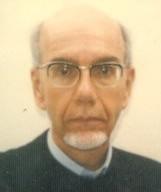Daniel Comboni
Comboni Missionaries
Institutional area
Other links
Newsletter
In Pace Christi
Dalfovo Alberto
Fr. Alberto, known as Tito, was born on 27 November, 1933, in Las Heras, Buenos Aires, Argentina to where his parents had migrated from Italy. A few years later, they returned to Andalo (Trent), Italy, and Alberto, brought up in that devoutly catholic family, soon decided to consecrate his life to the mission.
He spent his formative years – from 1951 to 1960 – first in Florence, then in Sunningdale (England) and in Venegono (VA). Ordained priest in April, 1960, he spent all his priestly and missionary life in Uganda – from 1960 to 2008 – except for a brief period of two years in Rome (1982-1984) as Secretary General.
When he arrived in Uganda in 1960, Fr. Alberto was sent to Koboko as curate to Fr. Bernardo Sartori, then parish priest, together with Fr. Francesco Cifaldi, who was director of schools. This first missionary experience of his alongside a saint was of fundamental importance – as Fr. Maurizio Balducci said at the funeral. “His life was entirely dedicated to seeking and studying the truth, the face of God’s incarnate wisdom as revealed in humankind and in cultures”.
Fr. Antonio Solcia, who was with him in Uganda, remembers him thus: “Immediately after his arrival, he got down to studying the Kakwa language and, being gifted in languages, he learned it well: I think he was the only Comboni to learn this language. A year later, Fr. Sartori went to open the mission of Otumbari and Fr. Alberto was left alone in the parish for a year and then he also went to Otumbari. As well as in his ministry, he was involved in building the church, getting all the Christians to take part through a collection. When Fr. Meneghini left Arua, Fr. Alberto was asked to go there, to the parish of Christ the King, to be director of the ‘Nile Gazette’, a newspaper in English for Arua and part of Gulu. Meanwhile, he began to study the customs and traditions of the Lugbara. He did such a good job with the ‘Nile Gazette’ that he was asked to be the director of ‘Leadership’ which, at that time, was being produced mostly for Northern Uganda. In the meantime, he immersed himself in his studies, enrolling at Makerere University for a ‘Master’s degree’. His tutor, amazed at how hard Alberto worked on his research – something unnecessary, in his view, for a ‘Master’s degree’ – suggested that he continued to study for a doctorate (PHD), a difficult task, even in those days. Fr. Alberto found the proposal encouraging and presented his work. He was only the second person to be awarded such a degree.
At that time, a well-known professor of that university, John Mbiti, left the chair of Philosophy and asked Fr. Alberto to apply for the post. This was how Fr. Alberto joined the staff of Makerere University. The post was very demanding, especially due to the seminars he had to conduct abroad.
Fr. Alberto also published a booklet, much appreciated even today, of ‘Lugbara Proverbs’, and various articles for ‘Anthropos’ magazine. He retired from the chair but for some years continued to accompany students in their research until sickness prevented him from doing so”.
In 2008, he went back to Italy for health reasons and went first to the Centre for the sick in Verona and then to the Bro. Alfredo Fiorini Centre in Castel D’Azzano where he remained until the day before he died. On 2 February, he was taken to Negrar hospital where he died the following day.
The local paper “Trentino” wrote that the death of Fr. Alberto was a great loss to the community of Andalo and reported the words spoken by the Alderman for Culture, Claudia Osti, in the name of the town administration: “As a person he was transparent, reserved, elegant, an able orator, a keen philosopher and religious who leaves behind a great vacuum but also an undeniable example of life”.
Speaking of his last years, Fr. Balducci said: “his edgy and reserved character obviously did not help him in personal relations but his long years of sickness purified him in this. I believe that, with the constant help of Fr. Sartori, his last years were ones of discovery and re-interpretation, not academic but interior, of the human person and his own person”.
Fr. Giovanni Taneburgo, speaking of the esteem in which he always held Fr. Alberto, and the tenderness and friendship that bound him to him during his final years, sought to point out some characteristics of this missionary “who leaves a legacy that may indeed be creative. Seeing him in a detached way, he would have seemed severe, demanding, rather insensitive to those around him, and altogether absorbed in the world of his studies, teaching and affirmation. But anyone who had dealings with him and succeeded in going beyond mere appearances would have discovered a Fr. Alberto who was quite different, thanks to his interior traits: he had a great sense of God whom he placed at the centre of his life, especially in the context of prayer. He was a man who was coherent, of genuine character, who rejected all compromise, at times with seemingly excessive force. He had a deep sense of the mission entrusted to him by the Lord, simply that of teaching; he took it very seriously and very thoroughly prepared every lecture he gave at the University. He loved the Institute and suffered greatly when it seemed the knowledge of the Founder was not being well promoted or when confreres did not have a clear sense of belonging to the Comboni Family. He was very sensitive to pain and sometimes allowed himself to complain, though his complaints turned into prayers and the acceptance of the will of God”.
Da Mccj Bulletin n. 270 suppl. In Memoriam, gennaio 2017, pp. 13-18.

